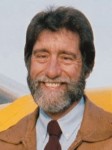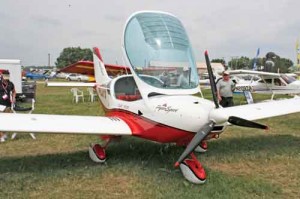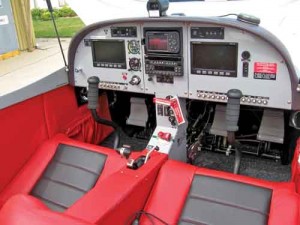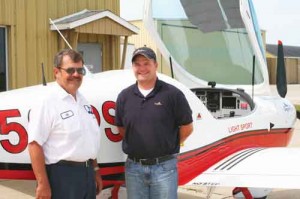 Sport Pilot & Light Sport Aircraft – by Ed Leineweber
Sport Pilot & Light Sport Aircraft – by Ed Leineweber
Wow! That happened fast! While airplanes are fast-moving machines, developments in the aviation world usually do not set speed records. (Take the 10-year development of the Sport Pilot/Light Sport Aircraft rule, for instance.) But the story of Piper Aircraft, Inc.’s entry into the Special Light Sport Aircraft (S-LSA) market place, and the designation of North Iowa Air Service as its Midwestern distributor, is one fast-paced saga, taking less than six months from start to finish. It’s an exciting tale, portending good things for the Sport Pilot/Light Sport Aircraft movement, not only here in the midlands, but across the nation as well.

First, a quick recap on the history of what is now the Piper Sport S-LSA. Only last October I attended the first Midwest Light Sport Expo at Mount Vernon, Illinois, and interviewed the then-dealer of the then-named Sport Cruiser manufactured by a Czech company then known as Czech Aircraft Works. The aircraft impressed me, and the dealer and I discussed the possibility of a demonstration flight at my home base later last fall. That demo never happened, and now I know why. A deal with Piper, rumored to be in the works last October, came to fruition with the January, 2010, announcement that the Rotax 912-powered Sport Cruiser, slightly tweaked and renamed the Piper Sport, would be the Piper entry into the crowded and still expanding S-LSA market. Piper’s arrival as an S-LSA vendor is the biggest Sport Pilot/LSA news story of 2010, and for good reason.
As with the decision by Cessna to enter the S-LSA field with its Sky Catcher, the arrival of the big guys validates the Light Sport Aircraft concept, gives assurances to those who might question the ASTM consensus standards design, manufacturing and maintenance approach, and virtually guarantees the ultimate success of this new way of doing business in aviation.

Of course, some might view Piper’s entry as another blow to the scores of smaller competitors who hope to establish a foothold in the market for themselves, as more buyers might be expected to gravitate toward the bigger, more established players, in the hopes of securing better, more reliable parts and service support. An optimist, like me, would choose to believe that a well-established market will afford smaller players opportunities for success through product differentiation, innovation, pricing and superior customer service.

Besides, the entry of the big players into the S-LSA field provides lots of opportunity for the little guys as well, as can be seen from the designation of North Iowa Air Service as the Piper Sport distributor in Iowa, North and South Dakota, Nebraska, Minnesota, Wisconsin and Illinois. Aircraft retailing, maintenance, flight training, rental and air charter has always been largely a mom-and-pop business, and the developing S-LSA industry seems to be following that same course.
North Iowa Air Service is a classic example of the general aviation fixed base operation (FBO) as we have known it, and appears to be a case study into how the Sport Pilot/Light Sport Aircraft movement will be carried forward into the future. It is at this retail level, where the lagging development of LSA sales, flight training, service and rental infrastructure is currently the biggest constraint on the growth and ultimate success of the movement, that the smaller companies will make their mark. Let’s take a closer look at how this is poised to happen at North Iowa Air Service.
Legally incorporated as Charles City Aeronautics, Inc., North Iowa Air Service was formed in 1957 to provide airport management and aeronautical services to the North Iowa region. In the decades since, the company has evolved into a full-service fixed base operation at Northeast Iowa Regional Airport (CCY), offering aircraft sales, service, charter, fueling, storage, management, and flight training. In 2001, North Iowa Air Service began operations in Mason City, Iowa (MCW).
William R. Kyle owns the company, the son of co-founder Lyle J. Kyle. Bill started working for the company in 1966, and although he has a long list of piloting certificates and ratings, he has focused primarily on maintenance. North Iowa Air Service is an FAA Part 145 Certified Repair Station with an impressive array of privileges listed on its operating specifications. It will, of course, eventually be a Piper Sport Service Center as well. Bill is also a Designated Airworthiness Representative (DAR) and has taken an active interest in the homebuilt aircraft world.
Other members of the management team include Bill’s son, Todd Kyle, Vice President and Operations Manager; Betty Jo Ferch, Office Manager for the past 25 years; Bill’s wife, Jeannie Kyle, Corporate Secretary; and Mark Bonzer, Service Manager, who has been with the company for more than 30 years. Flight instruction is provided by CFI Chris Schrodt, who learned to fly with the Kyles and later came back to become part of the team. As you can see, all of these folks are veteran aviation professionals with years of aviation experience.
The “new blood” in the organization is Todd, who, now in his mid-30s, has only been in the organization for about 20 years (since he was 15 years old). Todd focuses primarily on piloting duties, including aircraft sales and piloting services, from the S-LSAs up through light jets. Todd is extremely enthusiastic about the Piper Sport distributorship, and the potential market he sees for the Piper entry into the S-LSA market. As the next Kyle seeking to make a life and a living as a third-generation FBO, Todd sees the new venture as the future of the family business.
Bill and Todd point to the proven skill of the Czech aviation industry, which produces the Piper Sport through a company now known as Czech Sport Aircraft. (A Piper investment company purchased this manufacturer in January 2010, just as the Piper Sport was being announced.) The aircraft are assembled and test flown in Europe before partially disassembled and loaded into containers for shipment to the U.S. Once here, they are re-assembled, inspected and issued their S-LSA Airworthiness Certificates.
The Kyles were naturals to become a Piper Sport distributor, having been a Piper dealer years ago before the development of the factory-direct and “super dealer” marketing system presently in place at Piper Aircraft for their non-S-LSA product line. They enjoy a long-standing and close relationship with the legacy dealer in their area, Des Moines Flying Service, and the territories of the two Piper vendors are co-terminus. The Kyles hope to be designated a Piper Sport assembly center in the near future.
Although there are three different models of the Piper Sport, including a basic model, a “trainer” and the LTD model, most purchasers appear to be choosing the top-of-the-line LTD, which typically includes a Dynon autopilot and glass panel instrumentation, Garmin radios, and a ballistic recovery parachute. The models are priced at $119,900, $129,900 and $139,900 respectively. The Kyles plan to focus on the LTD due to the apparent predominant customer preference.
Todd reports that, although the typical S-LSA customer is an existing pilot looking to take advantage of Sport Pilot privileges, or downsize from a larger aircraft, he has encountered definite signs of the Piper Sport’s appeal to potentially new entrants to the aviation world. He takes this as a very encouraging sign, and so do I.
Of course, one of the major hurdles remains the price of admission. Piper is attempting to address this through its in-house financing programs and through “Piper Match,” a company-owned, dealer-accessible database of aviators who are interested in sharing an aircraft to reduce the costs of ownership.
A closely related issue, mentioned earlier, remains the relative lack of S-LSA training and rental aircraft on the ramps of FBOs across the country. Todd Kyle acknowledges this problem, and pledges to work hard to fill in some of those empty slots with brand new Piper Sport S-LSAs. This might be accomplished, he suggests, through traditional leaseback arrangements with owners seeking to defray some of the cost of the new aircraft, and maybe even through dealer-owned aircraft at strategic locations around the territory. Any small steps in the direction of developing retail training, rental and service infrastructure will be steps in the right direction.
Although I do not purport to offer pilot aircraft evaluations in my articles, I can never resist a demo flight, and jumped at the opportunity to fly the Piper Sport. Bottom line: I sure wish I could figure out how to base one at LNR for my own flight training and future rental operation there. I am convinced it would sell itself after a short introductory flight. I have no doubt that Piper’s entry into the S-LSA world will quickly become an industry leader in sales.
Bill and Todd Kyle, and the other folks at North Iowa Air Service, are old-line aviation professionals with new visions, energy and enthusiasm. Piper made a wise choice in selecting them to introduce the Piper Sport in the Midwest. Give them a call at (641) 424-9366 and arrange for a demonstration flight at your airport (www. northiowaair.com).